How to Balance Hormones Naturally, According to Experts

Your hormones do a lot for you—many experts refer to them a "chemical messengers," traveling throughout your body, helping control functions. "You need hormones to maintain almost every body tissue, and down the line, unbalanced hormones can lead to the early development of many issues related to early-age death, like cognitive decline, cancer, cardiovascular disease, and bone or muscle loss," says Zandra Palma, MD, of Parsley Health. "Hormones also affect your mood, energy, sleep, metabolism, social behavior, immune system, inflammation, and pain in real time, so you want to keep them balanced! For example, unbalanced hormones affect your gut barrier and microbiome (and also vice-versa), which mediates inflammation for your whole body."
And guess what—for many of us, our hormones are imbalanced. While this can be due to certain lifestyle factors, it's also just a result of the times we live in. Heather Bartos, MD, a board-certified OBGYN and founder of Be. Women's Health and Wellness clinic, says two main reasons are environment and the prevalence of obesity in our society, both of which cause us to be over-estrogenized. "We live in an environment that is not natural," Bartos says. "It has pesticides, plastics, hormones, and stuff in our meats and milks, although it's better than it used to be."
How to Recognize Imbalanced Hormones

There are a variety of symptoms to look out for to recognize if your hormones are imbalanced, so it's important to pay attention to your body. "Eighty percent of women have a hormonal imbalance that they are not really aware of. And they don't do anything because they don't know how to interpret the signals of their bodies," adds Alisa Vitti, functional nutritionist, author, and founder of Flo Living.
Some symptoms include difficulty losing weight, irregular periods, difficulty sleeping, acne, skin problems, infertility, period problems (clots, heavy cycles, periods that are too frequent)… the list goes on and on. Bartos says it runs the gamut from menstrual, dermatologic, psychological (depression, anxiety), and endocrine (hot flashes, cold flashes) problems.
To get a better idea of the imbalance, you'll have to see your doctor or healthcare professional who can run tests for you. Palma says there are blood, urine, and saliva testing that can be done.
Why You Need to Balance Your Hormones

If these problems and symptoms persist, it's better to take action for your long-term benefit—and it doesn't have to do with just your fertility. "We don't just need estrogens to maintain the female tissues that you think of like the uterus, the ovaries, the vagina, and the breast; you need estrogen to maintain the heart, skin, muscles, bones, and tissue in the brain for cognitive function," Palma says. "So you need these hormones for literally every tissue in the body to stay functioning. It's also the electrolytes, kidneys, and liver. You need it for the gut." If your tissues and systems aren't functioning properly, you'll be on a faster track for health issues like cardiovascular disease, cancer, diabetes, and dementia.
How to Balance Your Hormones
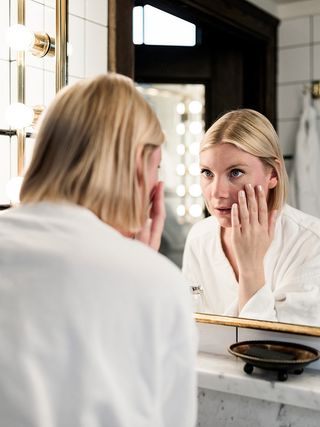
We asked our three experts to share their tips for balancing hormones, which they shared below. But before you start to make any big lifestyle changes, you'll want to discuss all of this with a healthcare professional so it can be more tailored to your body.
1. Know Your Norm

"Number one is to know your norm," Bartos advises. "What I have women do is start keeping track of what their cycles look like���where is their cycle? Is it 28 days to 30? Is it 35? When do they ovulate? It's a little bit of responsibility on that person's side to see where their cycle is because if they don't know, then you can't balance it."
If you want to get more detailed, Vitti suggests using her MyFlo app to track the phases of your cycle and change your exercise and eating habits based on the week of your cycle, because things like your metabolism can change from week to week.
2. Apply Wild Yam Cream
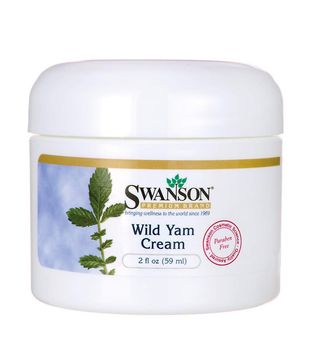
The idea might seem funny, but Bartos says it works because it's a natural source of progesterone. And she adds, it's not like the yams you eat at Thanksgiving if you're wondering.
"Once you see where your cycle is, you can actually put a pea-sized dollop on a place like your inner thigh because it's a fatty area for most women, and I like the fatty areas for this," Bartos says. "Start putting it on day 14 of your cycle. It helps to kind of support that luteal phase of the cycle, and it helps to kind of shorten, normalize the menstrual cycle. It's a great way to add more progesterone because for most women who ovulate normally, they need that extra progesterone during that part, so that's a great way to balance naturally."
Bartos recommends applying in the morning after you've taken a shower and putting some on your left thigh on day 14, you right side on day 15, and switch back and forth until day 26. Make sure you wash your hands well afterward.
3. Meditate
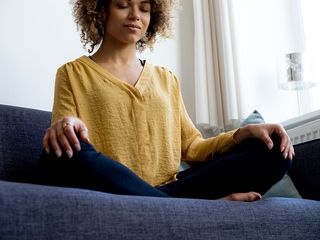
Or try something that you know helps you decrease your stress levels. This will keep your cortisol in check, which is important since unbalanced cortisol levels can lead to inflammation, and chronic inflammation can lead to diseases like cancer, diabetes, and metabolic syndromes.
4. Try Supplements
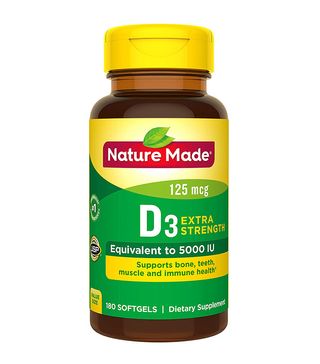
This will depend on your situation (and something you'll want to figure out with your doctor), but Vitti recommends B vitamin, vitamin D3, and omega-3 fatty acids. (These are also found in Flo Living's Balance supplements). "Those are super-essential, non-negotiable micronutrients that the endocrine system needs to do its job, especially because those are the very micronutrients that often get super depleted when you drink a lot of caffeine and alcohol, live a busy lifestyle, work out a lot, and have stress," she says. Vitti also suggests a magnesium supplement, because it's involved in over 300 catalytic reactions in the body and is essential for hormonal function.
5. Eat
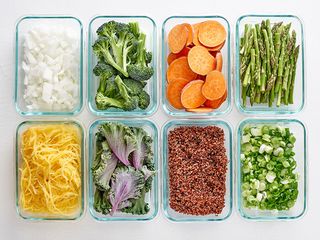
"For general hormonal balance, I would say eat," Bartos says. "Some people just don't eat. So consume a balanced a diet." She also suggests eating as much organic food as possible and limiting your intake of sugar, gluten, dairy, caffeine, and alcohol. You don't have to eliminate, just limit.
6. Do Yoga
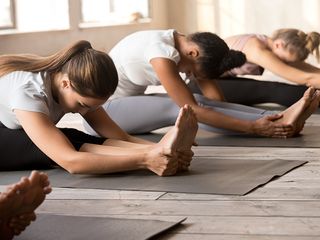
Exercise helps, but Bartos recommends trying restorative ones, instead of high-intensity workouts like CrossFit. "There are a lot of yoga poses that are very restorative to the adrenals, and your adrenals do a shit load of work and they get very little thanks for it," she says. "That's what makes cortisol, pregnenolone, and all these things."
These calming exercises like restorative yoga and Pilates will help and get you in shape, too. "Everyone thinks, 'Oh, I've got to get in shape by going out and running for six miles.'" she adds. "That's good, but if your adrenals are already in the crapper, you're just going to wear them out more."
Next up: 10 Foods to Eat on Your Period And 6 to Avoid
This article was originally published at an earlier date and has been updated.
Disclaimer
This article is provided for informational purposes only and is not intended to be used in the place of advice of your physician or other medical professionals. You should always consult with your doctor or healthcare provider first with any health-related questions.
Sarah is lifestyle writer and editor with over 10 years of experience covering health and wellness, interior design, food, beauty, and tech. Born and raised in Los Angeles, she attended New York University and lived in New York for 12 years before returning to L.A. in 2019.
In addition to her work on THE/THIRTY and Who What Wear, she held editor roles at Apartment Therapy, Real Simple, House Beautiful, Elle Decor, and The Bump (sister site of The Knot).
She has a passion for health and wellness, but she especially loves writing about mental health. Her self-care routine consists of five things: a good workout, “me” time on the regular, an intriguing book/podcast/playlist to unwind after a long day, naps, and decorating her home.